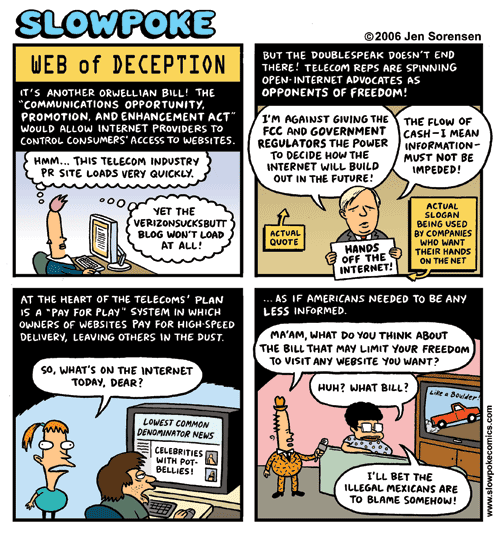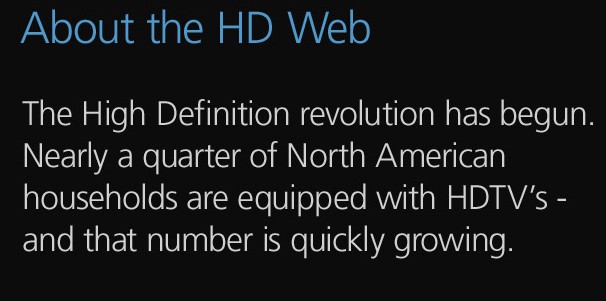Yesterday, Stop the Cap! raised the issue of how exactly Frontier Communications can offer access to the various “extras” the company offers to broadband customers all while limiting them to 5GB of consumption.
A number of readers have shared exactly the same concerns, not only with us, but the company as well.
It is interesting watching our concerns here get answered with shifting policies and vague promises over there, both on the Frontier website and in replies to customer inquiries. Unfortunately, they keep digging the hole they’ve gotten themselves into deeper and deeper with every passing day.
Intentionally or not, Frontier has now stepped on the landmine of the Net Neutrality debate.
Stop the Cap! reader William received a reply from Frontier that was remarkable for its less-than-certain tone, and the latest company line:
I can certainly understand your frustration and confusion on who’s
statement’s to follow.
Unfortunately at the present all we know is what we have been told about the situation and that is that we (Frontier) are reserving the right to charge or terminate service for those that exceed the cap.
Currently feedback such as yours is being recorded and passed on to those that are in charge of this proposed change.
The email your received is correct, we are not currently enforcing this policy and we have been informed that, at the present, the plan is to start the enforcement part of the policy in December or January. Again that is the current time table we have been made aware of.
I do know that we have been made aware that certain activities such as carbonite backup and other services we offer can be excluded from the bandwidth usage. I wish I could offer more information with regards to the plan, unfortunately what was/is published is what there is to know at the present. We are passing all feedback to higher levels and it is possible the plan may change before it goes live so to speak.
I know the above does not answer all your questions, unfortunately since the plan is not finalized I can only offer what information I know to be accurate at the present.
There are several points raised in this reply.
First, it’s clear that those contacting Frontier’s support team should recognize the support personnel are absolutely not responsible for the corporate policy decisions being made by management in Connecticut. It is patently obvious to a lot of readers who have heard back from Frontier that there is no great enthusiasm for a usage cap among a lot of folks working for the company. We have always tried to draw a strong line between those responsible for these usage caps – upper management, and the employees who are stuck having to implement them. We have nothing but good things to say about the support people who are in a tough position on this issue.
Second, our own sources have confirmed the timetable outlined in this reply from Frontier’s support personnel. And again, that is entirely a management decision.

Frontier Steps on Net Neutrality Landmine As It Digs the PR Hole Deeper and Deeper Over a 5GB Usage Cap. (Slowpoke used by permission, copyright 2006, Jen Sorensen - Visit http://www.slowpokecomics.com.)
Third, Frontier’s newest acknowledgement that they are considering excluding their preferred partners from the usage cap now opens the can of worms over the Net Neutrality issue.
Certain telecommunications companies have been attempting to change the Internet as we know it today. Currently, every online service has an equal shot on the network. But some companies want to change the playing field, by offering selected partners “enhanced” access to customers, faster data networks, and more prominent placement, either by paying a higher fee or entering into a partnership with an Internet Service Provider (ISP).
A “preferred partner” quickly becomes the cream rising to the top, not based on their merits, but rather by their deep pockets and willingness to pay their way to number one. Better yet, such partnerships allow both companies to reap the rewards gained from driving more subscribers to the content they wish to promote, and enjoying the enhanced advertising revenue which often accompanies such services.
More alarming are efforts to manipulate customers by penalizing them for accessing non-preferred content, and a usage cap or bandwidth limitation on those services that lack a preferred partner agreement is a great way to accomplish that.
This doesn’t just manipulate the playing field, it destroys it, giving enormous advantages to a select few.
Such agreements will devastate a lot of start-up companies that have brought the most creative and revolutionary new services to the Net. Virtually all of these companies would not exist without reaching out to investors for initial financing. In a world without Net Neutrality, inevitably one of the questions that will be asked is whether or not that start-up has any “preferred relationship” with a bandwidth provider. If that company does not, questions will be raised about the viability of that venture, especially if usage caps and bandwidth limits are widespread. And once an agreement is made, how does someone new break through? Under these conditions, expect a number of investors to simply take a walk.
Stop the Cap! has previously raised questions about ISP’s making an end run around Net Neutrality by imposing caps but exempting content or services accessed from that provider’s web portal. That has always been our prediction, but until today, there has not been a real world example of that practice in action or imminent.
Now, Frontier Communications is poised to prove us right once again by potentially giving cap-free, preferential treatment to their partners, but sticking it to every other video content provider or online backup service where the 5GB cap will apply.
Ask yourself: Would you use an online service that consumed significant bandwidth that was subject to a usage cap or one that was exempted from it? Is this what you are paying for every month – to be told what services and sites to visit and effectively penalizing you for choosing to make up your own mind?
It’s just one more reason why usage caps are an incredibly bad idea, and one that actually invites government scrutiny, if not direct oversight. It’s an issue we intend to raise with our elected officials. I’m certain Frontier Communications had no intention of being a poster child for the issue of Net Neutrality, but as we’ve seen time and time again in the short time Stop the Cap! has been online, there is a fundamental disconnect by upper management in understanding the implications and consequences of what they thought would simply be a great way to enhance profits and reduce “excessive usage.”


 Subscribe
Subscribe



